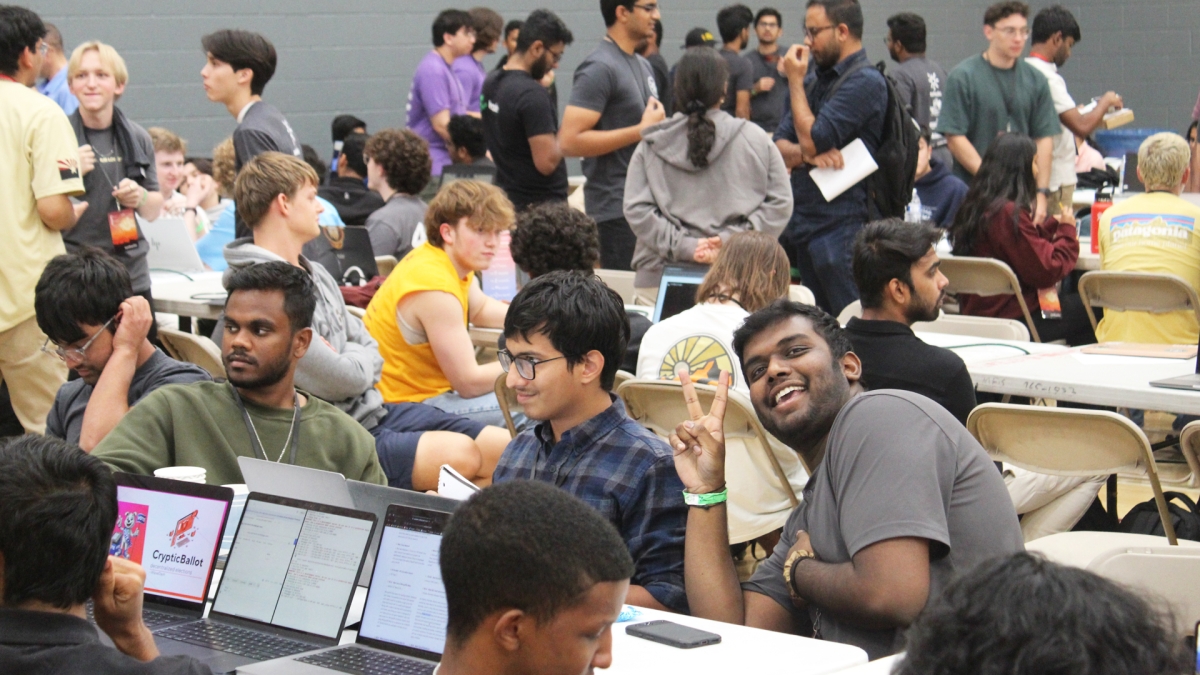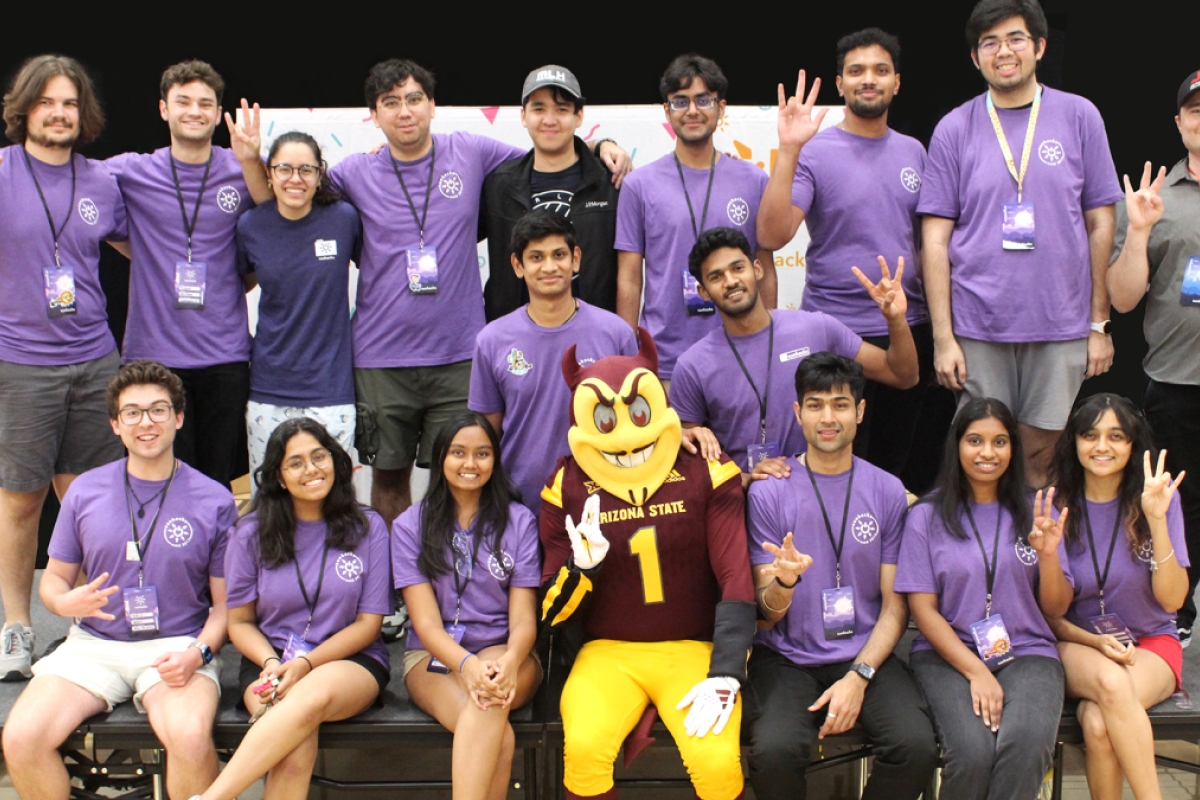Bright minds hack for fun, social good

Students participate in the fall 2024 sunhacks hackathon, hosted by the sunhacks student organization from the Ira A. Fulton Schools of Engineering at Arizona State University. More than 600 student hackers participated in a 24-hour challenge to develop a prototype that solves a challenge they chose to address for fun or social good. Photo courtesy of Omkaar Shenoy
So you have an idea. Whether it’s something you want to do just for fun or you want to change the world, how do you make it happen?
At sunhacks, a student organization in the Ira A. Fulton Schools of Engineering at Arizona State University, students can find a collaborative community to help them build the skills they need to turn their ideas into reality.
The group hosts a yearly hackathon — Arizona’s largest, drawing hundreds of participants from the region — that invites students from all backgrounds to work on a project for 24 hours. As “hackers,” student participants are encouraged to think creatively to find solutions to a challenge of their choosing.
“Our duty is to provide our hackers with the resources and opportunities to develop whatever they envision,” says Trenton Ward, a co-lead director at sunhacks and a robotics and autonomous systems graduate student in the Fulton Schools. “By bringing hackers together with mentors, sponsors, community connections and each other, we support a network of motivated people to be able to pursue their goals and ideas to the highest extent.”
A collaborative community experience
As an “innovation incubator,” hackathons encourage students to experiment with bold, new ideas and create solutions with real-world impact. The lessons they learn and new skills they acquire are useful throughout their academic and professional careers.
“By providing a collaborative space where people from various disciplines and backgrounds come together, we hope new ideas emerge that wouldn’t happen in isolation,” says Omkaar Shenoy, director of hacker experience at sunhacks and a computer science senior.
During the fall 2024 event, held Sept. 28 and 29, more than 600 hackers gathered at the Sun Devil Fitness Complex on ASU’s Tempe campus to work on their sunhacks projects. In addition to computer science and engineering majors, the participants included students studying mathematics, art, prelaw, psychology, business administration and political science. About 30 students even traveled from Tucson, Arizona, and other states, including Texas and California, to participate.
Hackers can work individually, with a group of friends or make a team of new connections. Alongside their peers, the participants are supported by student and industry professional mentors to help troubleshoot problems, refine ideas and collaborate on technical challenges.
Throughout the event, representatives from sponsors Amazon, State Farm, Garmin and General Dynamics were available at tables for questions and to provide real-world insights to help teams improve their projects. Industry professionals from Amazon Web Services and Microsoft hosted workshops about the technologies hackers could use in their work. Mentors and judges represented companies including Meta, American Express and Nike.
As the only member of Major League Hacking in Arizona, sunhacks sets itself apart from other hackathons. Through partnerships with major technology companies, sunhacks participants get increased access to leading industry software and hardware tools that empower them to learn, build and share their ideas.
“Hackers worked on projects ranging from artificial intelligence tools to help prep for tech interviews to musical apps,” says Paul Horton, founding organizer, sunhacks associate and a doctoral candidate in exploration systems design. “Many of the hackers utilized the Major League Hacking Hardware Lab sponsored by DigiKey to build awesome physical projects to help solve problems like bike theft and remembering medication.”
The experience wasn’t all about working on a single project and exploring technology because sunhacks is about having fun, Horton says. The participants also competed in a paper airplane competition, took a break with therapy dogs, sang in a midnight karaoke session with frozen yogurt and played board games into the early hours of the morning.
Recognizing ideas and effort
Completing a working prototype from idea to execution in a single day is an achievement in itself, but the hackers also competed for nearly $5,000 in prizes in 18 award categories. The various awards celebrate the wide range of creativity and skill that participants bring to the table.
First-place winner Fable created an all-in-one storytelling hub to generate and play bedtime stories using multiple artificial intelligence technologies. In second place, Melodia allows musicians to add instruments to existing songs. The third-place team, I Want _, helps people find meal options to meet their nutritional goals.
Even the most outrageous projects help hackers gain new skills.
“(S)unhacks is all about not taking things too seriously and having fun building something cool,” Horton says. “We love seeing hackers build technically impressive projects to accomplish quirky goals.”
This year, sunhacks challenged participants to make the most impractical project of the hackathon. Vying for that honor — as well as the best team mascot award — inspired the Impractical Catculator team to make a malfunctioning and annoying calculator. The experience taught web development skills to the team members who had never made anything with HTML, CSS and JavaScript before.
Inclusion and accessibility are priorities at sunhacks, so the organizers aim to welcome and support hackers of all backgrounds, skill levels and experience. With more than 380 students participating in their first hackathon, many were trying out coding and other hacking skills for the first time. The ASU Software Developers Association student organization sponsored the Best Rookie Hack award to recognize their efforts.
The rookie award was presented to a team of new programmers who set out to create HeadCount, an automated program to count people for events like career fairs. Building a successful prototype was a big achievement as three of the four team members were participating in their first hackathon.
Another award focused on excellence in accessibility, exposing hackers to problems not often covered in classrooms. Glance Guide won this award for a project that uses eye tracking to allow users to select and interact with digital content by looking at it, enabling innovative ways to interface with computers.
One-day event opens up countless opportunities
The experience’s interdisciplinary nature encourages participants to work with people outside their major and use each other’s strengths to contribute to a successful outcome. The quick pace of development also prepares students for their careers.
Interested in joining the sunhacks organizing team?
Fill out the sunhacks organizer interest form to get started.
“The fast-paced environment reflects real-world industry scenarios, making hackathons a valuable way to connect academic knowledge with professional skills,” says Saharsh Goenka, co-lead director of sunhacks and a computer science senior. “For many, the projects developed at these events set them apart from other aspiring interns and full-time hires.”
Students also make valuable connections, from new friends to mentors to professionals in the industries they’re interested in.
“These connections often lead to internships, collaborative projects or even startups,” Goenka says. “The sense of community is something we deeply value and work hard to foster throughout the event.”
Shenoy says they’re looking for additional partnerships and workshop opportunities for the next sunhacks.
“Our goal is to create even more opportunities for students to learn, innovate and solve real-world problems with the help of industry mentors,” Shenoy says.
Cecilia La Place, founding sunhacks member and associate and doctoral candidate in engineering education systems and design, added that “sunhacks is actively looking for new organizers. The team is built from majors all over ASU. We couldn't do what we do without the diverse backgrounds we gather to put on this fun-filled weekend.”
More Sun Devil community

ASU wide receiver Xavier Guillory driven by faith, family and heritage
It’s a few minutes into the Zoom call when Arizona State senior wide receiver Xavier Guillory is asked about his father.He looks up and keeps his gaze there, as if he’s picturing his father, Raphael…

Our photographers share their favorite photos of 2024
Photos can tell a story in ways that words sometimes can't, capturing the action, beauty and emotion of the moment. And as we look back at our top stories from 2024, we asked our ASU News…

How Kenny Dillingham remade ASU's football team in just 1 year
When Arizona State University football coach Kenny Dillingham went about rebuilding his roster after a 3-9 season in 2023, the most difficult thing he had to do was say no.Dillingham knew the Sun…
